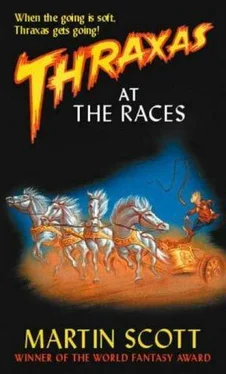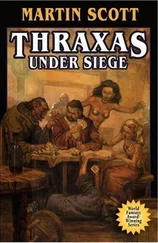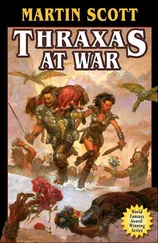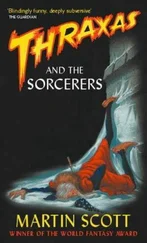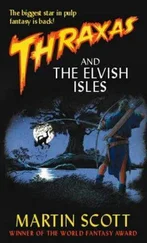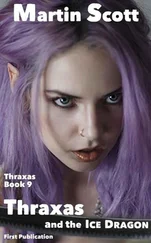Martin Scott - Thraxas at the races
Здесь есть возможность читать онлайн «Martin Scott - Thraxas at the races» весь текст электронной книги совершенно бесплатно (целиком полную версию без сокращений). В некоторых случаях можно слушать аудио, скачать через торрент в формате fb2 и присутствует краткое содержание. Год выпуска: 1999, ISBN: 1999, Издательство: Orbit, Жанр: Старинная литература, und. Описание произведения, (предисловие) а так же отзывы посетителей доступны на портале библиотеки ЛибКат.
- Название:Thraxas at the races
- Автор:
- Издательство:Orbit
- Жанр:
- Год:1999
- ISBN:9781857237344
- Рейтинг книги:5 / 5. Голосов: 1
-
Избранное:Добавить в избранное
- Отзывы:
-
Ваша оценка:
- 100
- 1
- 2
- 3
- 4
- 5
Thraxas at the races: краткое содержание, описание и аннотация
Предлагаем к чтению аннотацию, описание, краткое содержание или предисловие (зависит от того, что написал сам автор книги «Thraxas at the races»). Если вы не нашли необходимую информацию о книге — напишите в комментариях, мы постараемся отыскать её.
Thraxas at the races — читать онлайн бесплатно полную книгу (весь текст) целиком
Ниже представлен текст книги, разбитый по страницам. Система сохранения места последней прочитанной страницы, позволяет с удобством читать онлайн бесплатно книгу «Thraxas at the races», без необходимости каждый раз заново искать на чём Вы остановились. Поставьте закладку, и сможете в любой момент перейти на страницу, на которой закончили чтение.
Интервал:
Закладка:
Everyone is looking forward to the chariot races in the dry week after the rains stop, when the Turas Festival is held. Turas was the legendary founder of Turai, building a city after defeating several savage tribes and performing various heroic acts. It’s always a good time for Turai. It cheers up the citizens before the onset of the bitter winter. This year the festivities will take on a larger scale than usual because they come at the time of the Triple-Moon conjunction festival, which only happens every fifteen years or so.
I’ll be betting at the meeting, naturally, but I hadn’t planned putting anything on the last and most prestigious event, the Turas Memorial Race. Not with the Elves entering Moonlit River. It’s practically a shoo-in. The chariot belongs to Lisith-ar-Moh, a great Elvish Lord and a particular friend of Turai. Fifteen years ago Lisith-ar-Moh led a regiment of Elvish warriors through the Orc lines to the relief of Turai, arriving just as the Orcs breached our walls and various desperate Turanian soldiers, including myself, were trying to hold them back. He saved the city that day and we have never forgotten it. He’s visited several times since, as guest of honour to our King, and it’s because of his ties with the city that he’s entered a chariot in the Turas Memorial Race.
Everyone is pleased about that. We all like Elves here. The only thing wrong is that the Elvish chariot has more or less finished the Turas Memorial as a serious competition. We don’t breed horses up here the way the Elves do in the Southern Islands.
And yet . . . like any gambler I’m always interested when someone gives me a tip. I stood beside Senator Mursius when the east wall of the city was breached and watched him fight hand to hand with the savage Orcish force swarming over the debris and into the city. If Mursius hadn’t been there to lead us we’d never have held out till the Elves arrived.
“He’s not the sort of man to place his faith in a no-hoper,” I point out to Gurd, who was there that day as well.
“True. But chariot-owners always think they’re going to win,” replies Gurd. “You’ve lost plenty at the races already. No point throwing more away.”
Gurd and I reminisce about the war. We’ve done that often recently. The imminent arrival of Lord Lisith has certainly stirred up the memories. Orcs, dragons, walls tumbling to the ground under sorcerous attack, buildings on fire, the desperate battle, the sound of trumpets and the sudden unexpected arrival of the Elves. Even when they arrived it was no easy matter to defeat the Orcs. The fight continued all day and all night and all of the next day as well. It was quite an experience. So I figure Gurd and I are fully justified in bragging about our part in it, no matter what anyone might say when we wheel out our war stories for another airing.
Gurd is right about the race of course. And yet . . . Mursius is sharp as an Elf’s ear when it comes to chariot racing. He’s had a lot of success. I can feel myself being tempted. I banish it from my mind and get back to the task in hand, namely recovering Senator Mursius’s lost works of art. Gurd has a couple of good horses out the back and I ask the stable lad to saddle one of them up for me while Tanrose, the tavern cook and object of Gurd’s Barbarian affections, fills me a basket of provisions for the journey. I tie back my long hair and tuck it inside my tunic, then wrap myself in my cloak.
Just as I’m leaving Makri enters the tavern.
“I’m wet as a Mermaid’s blanket,” she states. “What a stupid climate this city has. If it isn’t too hot, it’s too wet. Now it’s both.”
I have to agree. The weather in Turai is often unpleasant. We have four months of blazing sun, one month of hot rain, about one month of a fairly temperate autumn, then four months of extreme, biting cold. After that there’s another rainy season, cold this time, lasting a month, before the month-long spring, which is pleasant.
“Which makes only two reasonable months a year,” growls Makri.
“At least it’s regular.”
“Why the hell did anyone ever build a city here?”
“Good harbour. And we’re on the main trade routes.”
Makri curses in archaic Elvish. She’s been learning the Royal Elvish language at her Guild classes and wants to practise.
“Not that the Elves ever curse the rain, or so I’m told,” continues Makri. Apparently they all sit around in their trees thinking it’s yet another fine part of nature. Stupid Elves.”
Makri was already fluent in Common Elvish when she arrived in Turai. Presumably that was from her Elvish grandparent, but who that was I’ve never asked, and Makri has never exactly explained. Nor has she talked about her Orcish grandparent. I wouldn’t dare ask. Anyway, both my Elvish and Orcish have improved a lot since she’s been around.
I ask her what she was doing wandering around in the rain. She tells me she was looking for plants.
“What for?”
“Natural history class at the Guild College. The Professor wants us all to study some interesting local plants.”
“That might be difficult in Twelve Seas. There aren’t any.”
“I know. I went to look in that small park behind Saint Rominius’s Lane. Unfortunately the park’s disappeared. Someone built a block of tenements right over it.”
King Reeth-Akan lays down strict regulations concerning the number of parks for his subjects. Even the poorest of areas should have open spaces for the citizenry to take their exercise and forget their cares for a while. Unfortunately the Prefects who control planning in each district are very amenable to looking the other way if bribed by property developers. It’s reached the stage now where there’s hardly an open space left in Twelve Seas. The last Prefect, Tholius, was as corrupt as they come. He was recently forced to flee the city after being caught out trying to divert some of the King’s gold into his own coffers. Obviously Drinius, his replacement, hasn’t wasted any time in lining his own pockets. You can tell a man of aristocratic birth because his name ends in “ius.” But you could work it out anyway by his amazing willingness to take money for favours. “Easy as bribing a Senator,” as they say. Not like the solid working-class citizens, who tend to have “ox” or “ax” in their names. Like Thraxas, for instance. They’re as honest as they come.
“I’m just heading off into the country,” I tell Makri. “Come along and study the plant life.”
Makri considers it. She has got the rest of the day free and she thinks she could use some exercise.
“Okay, I’ll come along if I can share the magic dry cloak,” she says, cunningly. “I need some interesting kind of plant. If I fail on this assignment Professor Toarius will be down on me like a bad spell.”
Makri scowls. From her frequent complaints I know that Professor Toarius is high on the long list of people associated with the Guild College who think it would be a far better place if it didn’t include Makri. It was him who forbade her to attend classes in her chainmail bikini because of the disturbance she was creating. Even the man’s tunic she put over it didn’t satisfy him.
“He said it showed too much of my thighs. Is that taboo in Turai?”
“No. Just distracting for young men trying to study philosophy.”
As a result of which she now has to wrap herself up in a voluminous cloak before going to college, even when the sun is beating down and it’s hot as Orcish hell, which it was all summer.
“Professor Toarius is as cold as an Orc’s heart,” grumbles Makri, and goes upstairs to get her axe.
Makri sticks at it though. She works hard, at the tavern and at the Guild College for the Education of the Sons of the Lower Classes. It’s her ambition to go to the Imperial University. This, as I have frequently pointed out, is impossible. The University doesn’t accept female students, especially ones with Orc blood in their veins. The Imperial University is such an exclusive institution, catering only for the offspring of aristocrats, that even our richest merchants have trouble getting their children in. It is a symbol of the complete control exercised by the ruling elite, which makes it even more impossible for Makri ever to attend. She refuses to be put off. “The Guild College didn’t take female students either before I insisted,” she points out. You have to admire her persistence.
Читать дальшеИнтервал:
Закладка:
Похожие книги на «Thraxas at the races»
Представляем Вашему вниманию похожие книги на «Thraxas at the races» списком для выбора. Мы отобрали схожую по названию и смыслу литературу в надежде предоставить читателям больше вариантов отыскать новые, интересные, ещё непрочитанные произведения.
Обсуждение, отзывы о книге «Thraxas at the races» и просто собственные мнения читателей. Оставьте ваши комментарии, напишите, что Вы думаете о произведении, его смысле или главных героях. Укажите что конкретно понравилось, а что нет, и почему Вы так считаете.
